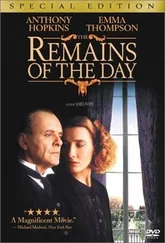I’m making it sound pretty bad, but none of us minded the discomforts one bit—it was all part of the excitement of being at the Cottages. If we were honest, though, particularly near the beginning, most of us would have admitted missing the guardians. A few of us, for a time, even tried to think of Keffers as a sort of guardian, but he was having none of it. You went up to greet him when he arrived in his van and he’d stare at you like you were mad. But this was one thing we’d been told over and over: that after Hailsham there’d be no more guardians, so we’d have to look after each other. And by and large, I’d say Hailsham prepared us well on that score.
Most of the students I was close to at Hailsham ended up at the Cottages that summer. Cynthia E.—the girl who’d said about me being Ruth’s “natural successor” that time in the Art Room—I wouldn’t have minded her, but she went to Dorset with the rest of her crowd. And Harry, the boy I’d nearly had sex with, I heard he went to Wales. But all our gang had stayed together. And if we ever missed the others, we could tell ourselves there was nothing stopping us going to visit them. For all our map lessons with Miss Emily, we had no real idea at that point about distances and how easy or hard it was to visit a particular place. We’d talk about getting lifts from the veterans when they were going on their trips, or else how in time we’d learn to drive ourselves and then we’d be able to see them whenever we pleased.
Of course, in practice, especially during the first months, we rarely stepped beyond the confines of the Cottages. We didn’t even walk about the surrounding countryside or wander into the nearby village. I don’t think we were afraid exactly. We all knew no one would stop us if we wandered off, provided we were back by the day and the time we entered into Keffers’s ledgerbook. That summer we arrived, we were constantly seeing veterans packing their bags and rucksacks and going off for two or three days at a time with what seemed to us scary nonchalance. We’d watched them with astonishment, wondering if by the following summer we’d be doing the same. Of course, we were, but in those early days, it didn’t seem possible. You have to remember that until that point we’d never been beyond the grounds of Hailsham, and we were just bewildered. If you’d told me then that within a year, I’d not only develop a habit of taking long solitary walks, but that I’d start learning to drive a car, I’d have thought you were mad.

Even Ruth looked daunted that sunny day the minibus dropped us in front of the farmhouse, circled round the little pond and disappeared up the slope. We could see hills in the distance that reminded us of the ones in the distance at Hailsham, but they seemed to us oddly crooked, like when you draw a picture of a friend and it’s almost right but not quite, and the face on the sheet gives you the creeps. But at least it was the summer, not the way the Cottages would get a few months on, with all the puddles frozen over and the rough ground frosted bone hard. The place looked beautiful and cosy, with overgrown grass everywhere—a novelty to us. We stood together in a huddle, the eight of us, and watched Keffers go in and out of the farmhouse, expecting him to address us at any moment. But he didn’t, and all we could catch was the odd irritated mutter about the students who already lived there. Once, as he went to get something from his van, he gave us a moody glance, then returned to the farmhouse and closed the door behind him.
Before too long, though, the veterans, who’d been having a bit of fun watching us being pathetic—we were to do much the same the following summer—came out and took us in hand. In fact, looking back, I see they really went out of their way helping us settle in. Even so, those first weeks were strange and we were glad we had each other. We’d always move about together and seemed to spend large parts of the day awkwardly standing outside the farmhouse, not knowing what else to do.
It’s funny now recalling the way it was at the beginning, because when I think of those two years at the Cottages, that scared, bewildered start doesn’t seem to go with any of the rest of it. If someone mentions the Cottages today, I think of easy-going days drifting in and out of each other’s rooms, the languid way the afternoon would fold into evening then into night. I think of my pile of old paperbacks, their pages gone wobbly, like they’d once belonged to the sea. I think about how I read them, lying on my front in the grass on warm afternoons, my hair—which I was growing long then—always falling across my vision. I think about the mornings waking up in my room at the top of the Black Barn to the voices of students outside in the field, arguing about poetry or philosophy; or the long winters, the breakfasts in steamed-up kitchens, meandering discussions around the table about Kafka or Picasso. It was always stuff like that at breakfast; never who you’d had sex with the night before, or why Larry and Helen weren’t talking to each other any more.
But then again, when I think about it, there’s a sense in which that picture of us on that first day, huddled together in front of the farmhouse, isn’t so incongruous after all. Because maybe, in a way, we didn’t leave it behind nearly as much as we might once have thought. Because somewhere underneath, a part of us stayed like that: fearful of the world around us, and—no matter how much we despised ourselves for it—unable quite to let each other go.

The veterans, who of course knew nothing about the history of Tommy and Ruth’s relationship, treated them as a long-established couple, and this seemed to please Ruth no end. For the first weeks after we arrived, she made a big deal of it, always putting her arm around Tommy, sometimes snogging him in the corner of a room while other people were still about. Well, this kind of thing might have been fine at Hailsham, but looked immature at the Cottages. The veteran couples never did anything showy in public, going about in a sensible sort of way, like a mother and father might do in a normal family.
There was, incidentally, something I noticed about these veteran couples at the Cottages—something Ruth, for all her close study of them, failed to spot—and this was how so many of their mannerisms were copied from the television. It first came to me watching this couple, Susie and Greg—probably the oldest students at the Cottages and generally thought to be “in charge” of the place. There was this particular thing Susie did whenever Greg set off on one of his speeches about Proust or whoever: she’d smile at the rest of us, roll her eyes, and mouth very emphatically, but only just audibly: “Gawd help us.” Television at Hailsham had been pretty restricted, and at the Cottages too—though there was nothing to stop us watching all day—no one was very keen on it. But there was an old set in the farmhouse and another in the Black Barn, and I’d watch every now and then. That’s how I realised that this “Gawd help us” stuff came from an American series, one of those with an audience laughing along at everything anyone said or did. There was a character—a large woman who lived next door to the main characters—who did exactly what Susie did, so when her husband went off on a big spiel, the audience would be waiting for her to roll her eyes and say “Gawd help us” so they could burst out with this huge laugh. Once I’d spotted this, I began to notice all kinds of other things the veteran couples had taken from TV programmes: the way they gestured to each other, sat together on sofas, even the way they argued and stormed out of rooms.
Читать дальше













